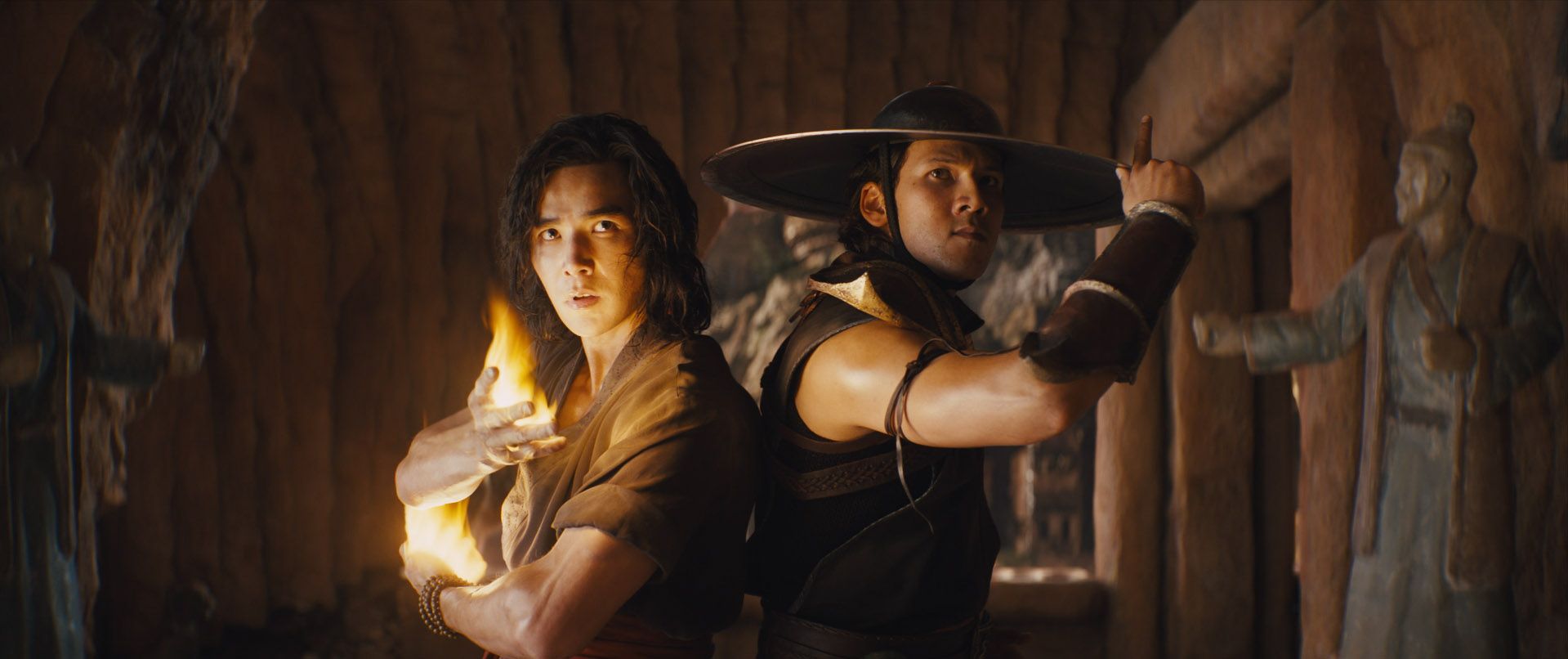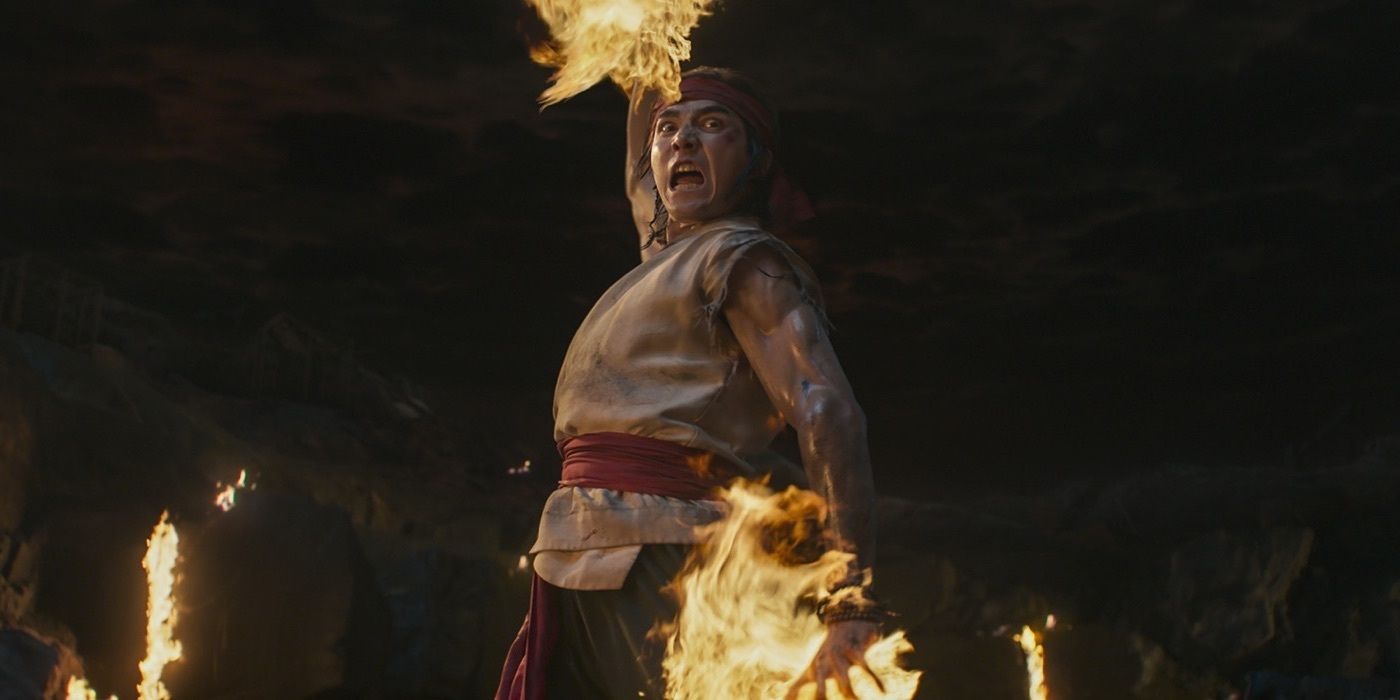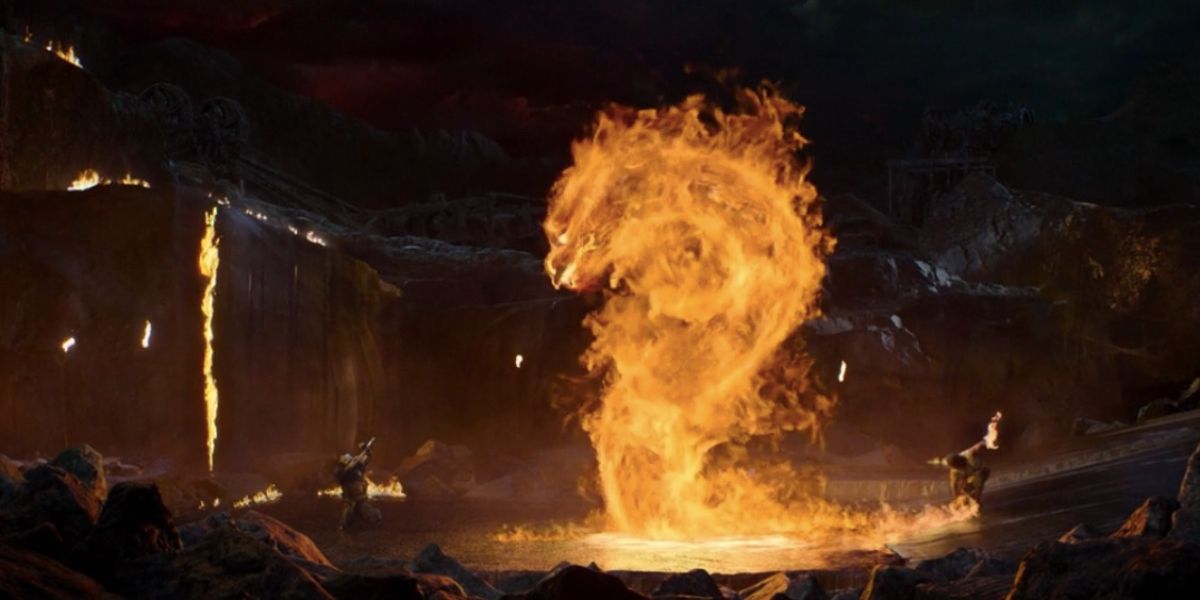[Editor's note: The following contains spoilers for Mortal Kombat.]
For a film adaptation of a long-running franchise that’s so interested in orienting newcomers it invented a new central character to learn about everything along with newcomers, 2021’s Mortal Kombat is stuffed to the brim with explicit fan service. From lines of dialogue cribbed explicitly from the game catchphrases, to characters recreating their gruesome fatalities, to a particularly inspired gag poking at players who spam sweep kicks, Mortal Kombat certainly wants to give fans “the thing they know from the game but in a movie instead.”
For the most part, I was struggling so heavily with the lack of foundational quality and competency in the aspects of the film’s storytelling and filmmaking, that any attempts at fan goodwill vis-a-vis familiar catch phrases blended together in white noise. Kano says “Kano wins”? Kung Lao says “Flawless victory”? Scorpion says “Get over here”? Fine, sure. Everything else about the film feels chaotic and stubborn, so why not include the nonsensical, arbitrary additions of pre-packaged nostalgia, too? Ya can’t hurt what’s already pained.
Except for one moment. This moment of fan service is so bonkers, so tonally flailing, so audaciously glued together that it latched and hatched into my ear holes upon impact, and has not stopped festering since. To its credit, it’s at least trying to track a piece of fan service to a piece of emotionally motivated character development, trying to treat the things screamed in the game by a deep-voiced announcer with a level of authority, ownership, reverence. To its detriment, well, everything else about the moment’s execution.
Let’s set the scene: Kung Lao (Max Huang) sacrifices himself in a fight against Sub-Zero (Joe Taslim) in order to protect our aforementioned new character Cole Young (Lewis Tan). Lao’s cousin and BFF warrior Liu Kang (Ludi Lin) later fights Kabal (Daniel Nelson in body, Damon Herriman in voice) during an intense (I guess) fight montage between Earthrealm and Outworld warriors. Kang winds up unleashing his signature fatality on Kabal, conjuring up a goshdarn fire dragon to chomp and destroy him.
And then, Liu Kang says four very confusing words in a row, in an off-camera chunk of audio that reeks of hasty editing and ADR panic-strickenness: “Fatality. For Kung Lao.”
“Fatality. For Kung Lao.” Let’s break it down. “Fatality” I understand; as stated, the film is full of characters saying the things they say in the video game because it’s what we want the characters to say because it’s familiar. And, indeed, Kang has just performed a fatality. I don’t love Lin’s line reading here, but fine, he’s going for understated reverence, it’s a choice, I won’t squabble.
“For Kung Lao” is where my brain starts to get fatalitied. Liu Kang believes he has achieved a sense of vengeance for the murder of Kung Lao in his demolishing of Kabal. But this simply is not true; Sub-Zero killed Kung Lao and then Shang Tsung (Chin Han) stole his soul. Kabal had nothing to do with it! Yes, Sub-Zero and Kabal are playing for the same team — Shang Tsung and His Merry Band of Tournament Rule Loophole Finders — but for a visceral moment of physical justice to land hard, I want it done to the person directly responsible, not a person who happens to be momentarily aligned to the same general cause. Plus, Sub-Zero already has a person out for revenge against him for an undue act of killing — Scorpion (Hiroyuki Sanada), whose journey against the freezey warrior bookends the picture satisfactorily. Why add another fighter to this mix of revenge-seeking and then not satisfy it with the proper story math? Why not just have Kabal kill Kung Lao originally? Can you imagine a Gladiator where Maximus kills the first random gladiator sent his way, says “That was for my family,” then sits down satisfied?
Beyond the logistic confusion this line flings me into, it also feels gutturally, emotionally dissatisfying, because of its complete lack of tonal understanding. Liu Kang just did something huge, bold, supernatural, and frankly campy in its performative aggression (made even more campy by the fact that it was against a glorified henchman). He made a fire dragon appear from nowhere and obliterate his foe. And maybe I’m too conditioned by things like the MCU or the Fast and Furious franchise to want some calling out of how big and zany these kinds of moments are, but at the very least, I want a follow-up line that drives in the same vibe lane, rather than hard swerving into two at once. “Fatality. For Kung Lao,” both doubles down on the silliness of fan service and attempts to make a big, emotional play as to why this fire-dragon death matters so deeply — all delivered quickly off-camera, all in reaction to the devastation of a masked character who had nothing to do with Kung Lao’s death. There is no humanity to this moment because this moment is carelessly constructed without an understanding of humanity.
It’s this lack of humanness that proliferates throughout and deflates all of Mortal Kombat for me. This moment is a microcosm, a symptom and symbol of the frantic lack of intention and meaning in the entire picture, a frustrating misunderstanding of what fans want, like, and need. I see a lot of people finding joy in the big, dumb energy of Mortal Kombat, and I am so happy for, and even envious of, them. I just think even big, dumb movies like Mortal Kombat deserve to have smarter, more satisfying moments than confusing mish-mash hooey like “Fatality. For Kung Lao.” And I think we all deserve that, too.



